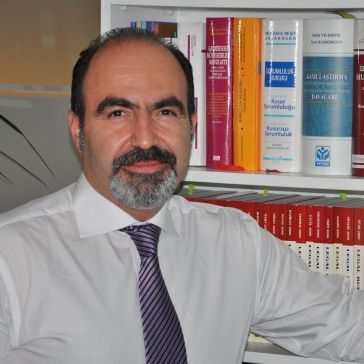Central and Eastern Europe is not as sexy as it was prior to the 1997-98 global economic crash, and it may not fully recover full momentum for quite a while. Indeed, with international law firms such as Linklaters, Garrigues, DLA Piper, Clifford Chance, Simmons & Simmons, and, most recently, White & Case and Gide Loyrette Nouel pulling out of various CEE markets (January 30, 2014 and February 10, 2014), many firms seem to feel the region – with the exception perhaps of Turkey – is less attractive than it was during the 2004-2007 boom. CEE Legal Matters sought to explore the market potential of CEE countries for international law firms considering an entry by speaking to those who will ultimately sign off on the bill: General Counsels.

Oraz Durdyev, Legal Director and Compliance Officer for CEE, Anheuser-Busch InBev
We reached out to 27 country or regional General Counsels (we will use that term for ease of reference, although a number of lawyers we spoke to have a “Head of Legal” title instead) across CEE for input, in the process primarily targeting Fortune 500 companies, to offer a 20,000-foot view as to the receptiveness of potential clients to having more international firms set up shop in the region.
In order to explore the demand side of the question as to whether or not international firms should still be looking at CEE markets, we explored what the general preferences of General Counsels are, if any, regarding working with international firms or local players, the perceived unique selling points that the former have, and the importance of geographic proximity in providing superior service.
International Firms: What We Pay For
When asked whether they generally prefer to work with international or local firms, almost all General Counsels we spoke to explained that their answer depends on the nature of a given deal. Perhaps unsurprisingly, 23 out of the 27 General Counsels we asked expressed a strong preference towards working with an international firm on cross-border work. Oraz Durdyev, the Legal Director and Compliance Officer for CEE at Anheuser-Busch InBev, explained that in “international M&A or in any case with an international element we involve ILFs, due to their helicopter view.” According to Ahmed Dogan, Vice-President and General Counsel at Anagold in Turkey, “for cross border transactions or arbitration, an international firm is a must.”

Mustafa Gunes, former General Counsel, Multi Development
Aside from cross-border M&A, Przemyslaw Witas, General Counsel at CEDC International in Poland, also points to finance matters as ones where he generally prefers working with international firms: “On work related to bond issues, or any other type of complicated financial transactions, international banks appear in the equation meaning that international firms are generally better positioned to help.” And Attila Bocsak, the CEE Head of Legal for Turk Telekom, feels that ILFs are stronger in particularly cross-border forms of dispute resolution as well, saying that“complex international arbitration may also require the specialized knowledge that mostly international firms have.” However, one Legal Director in Russia that we spoke with, who asked not to be named, pointed out that this is not absolute and that there are “very well experienced local law firms as well that we work together with on international projects as well.”
In contrast, local firms tend to be preferred for local dispute resolution issues. According to Cosmin Vinatoru, Legal Director at Nobel in Romania, for “local projects, conducted exclusively in Romania and especially for litigations, local firms are preferred.” Szekely Gergely, Head of Legal at Allegro Group in Hungary, has a similar position:“Litigation co-operation with a local legal expert is much more favorable.” Other local issues such as basic corporate matters, labor law, or debt collection were also cited as areas where General Counsels emphasized a preference for local firms.
This makes sense in light of one of the elements that always plays a part when picking external counsel: Budgets. Bocsak explains that “the more specialized knowledge is required the higher rates can be justified, which, on the other hand, means, that it does not really make sense to engage an international firm for basic corporate or labor law work.” Marian Radu, Head of Legal at GRIVCO in Romania, has a similar take: “I am fully aware that many people still prefer working with an international firm just because they associate it with higher quality legal support but, at the end of the day, a lawyer from a local firm can prove to be the better solution if you take in consideration the whole package, including the financial one.”
So what are the unique selling points of international law firms? One is implicit in the tendency to use them in international transactions. As Gergo Budai, General Counsel and Deputy CEO at Invitel, expresses it, they simply “have the capability to do complex work in parallel across multiple jurisdictions.” And Vinatoru points out that, as an organization, “they have knowledge of multiple law systems and are able to combine them in the most effective way, often resulting in innovative solutions.” While this idea seems to be the main element for most of the General Counsels we spoke with, it is not irresistible. According to Witas, “having offices in multiple jurisdictions definitely helps as it offers a one-stop solution but it is not an absolute must. We have had transactions where we simply coordinated the work of various local counsels in different jurisdictions ourselves. It is not ideal, but not an impossible task”

Marian Radu, Head of Legal, GRIVCO Romania
Organizational culture was another common theme. Durdyev, for example, explains that “international firms often share the business culture of multinational companies.” And many of the General Counsels we spoke to noted that, as multinational entities themselves, international law firms may be especially attuned to the challenges faced by multinational clients, Mustafa Gunes, former General Counsel at Multi Development in Turkey, also explains that this has to do with “their relative closeness to the headquarters of the multinationals,” Witas also links to communication styles and explains that CEDC International’s expatriate board members find it much easier to coordinate with-London based lawyers.
One of the interesting elements that some of the General Counsels we spoke with highlighted as a unique selling point of international firms was their strong brand reputation. In fact, nine of the 27 we spoke to acknowledged that international firms tended to have considerably stronger brand names, which presumably provides a safer cover when explaining the decision to retain a firm to a company’s Board or CFO.
Of course, with that “brand” recognition comes an assumption of quality. But that may not be as strong a factor as it once was. Witas asserts that, in Poland, international law firms used to attract the best lawyers, but the skill gap between them and the local law firms has shrunk considerably in recent years. General Counsels in Hungary, Romania, Russia, and Serbia pointed to the same trend. Ultimately, Witas and others emphasize that in many instances, what really matters is the lawyer you are working with, not what firm’s name appears on his business card.

Cosmin Vinatoru, Legal Director, Nobel Romania
Still, when asked if the generally higher rates of international firms are justified by their unique selling points, 19 of the General Counsels we spoke to responded that, in general, they do. Budai did mention that, at times, “the starting rates are over the acceptable levels and need to be negotiated.”And of course higher rates generate higher expectations. As Radu notes, “in time higher rates must be justified by high quality deliverance, otherwise your clients may become reluctant to pay big money for something they can have with less expenditure.”Bocsak recognizes that international firms are often caught between a rock and a hard place: “I many times feel that international firms are stressed because of the discounted blended rates or price caps, which maybe lower than their guideline rates. Despite this, clients do expect high quality solutions from international firms irrespective of rebates.” On the other hand, Izabela Wisniewska, Head of Legal at Zara in Poland, points out that, “unfortunately there are inglorious examples where the high rates may only be justified by the known brand.“
Do You Need To Be On the Ground?
In working with external counsel, 11 of the General Counsels we spoke to emphasized the need to build a strong relationship based on trust. The question then becomes, to what extent is developing that relationship possible from a distance? General Counsels in Hungary, Russia, Romania, Serbia and Turkey in particular expressed a need for frequent face-to-face meetings. As Radu describes it, “I like to be able to speak to a lawyer in person, to get to know him a little, in order to make our collaboration smoother.” He conceded, however, that“good results can also be obtained by working with somebody you never get to know” — a feeling that is shared by most General Counsels that we spoke with.
While not impossible, many point to the ease of building those relationships from a simple logistical standpoint: “to interact personally is far more productive and faster then endless conference calls,”explains Durdyev. He also explains how you know that “you can rely on your Partner for a long relationship if he can be in your office in 24 hours if it is urgent.” The extent to which that is possible for a lawyer operating a CEE desk from London is debatable. However, Witas says of many of the better international firms without a presence on the ground “their efficiency in communicating and generally great responsiveness is still better than many of the local players.”
First-hand local knowledge is also perceived to be critical. Gergely states that “when it comes to support on local matters, having a office on the ground with high ranking local staff is essential.” Gunes explains that a good adviser should have local knowledge, but also should possess, “a good sense of the jurisdiction as well, which is simply national.”Naturally, this is relevant only for firms looking to gain market share in a specific country. As Bocsak explains for example “in our business we do not require a local office since international telecom contracts are just the same in London, Berlin, Istanbul, or Hong Kong.”
All Hail Competition
When asked if he would want to see more international firms opening up an office in Hungary, Budai replied simply “absolutely, to increase competition.”Asked the same question, Vinatoru in Romania had the same answer:“the more, the better. The competition will be high and the quality of services will definitely increase.”Radu agrees: “From clients’ point of view, the more, the better.”Indeed, with the exception of Russia and Poland, where most General Counsels feel the market is already saturated with international players, almost all General Counsels we spoke to said they would welcome more competition in their markets to drive up the quality of service and drive down rates. While no firm wants to engage in a race to the bottom for fees, the fact that so many General Counsels are open to new entries in the market should be a positive sign. Even in Russia, where the market does not seem to ache for more competition on the market, it has been voiced that expansions in the market with niche practice areas would be welcomed.
While Witas agrees that competition is always welcomed, he points out an additional benefit for firms considering opening an office. He believes that there is potential for many elite firms to carve out market share if they are on the ground since that will allow an additional number of potential clients to be exposed directly to their capabilities.
Ultimately, of course, decisions about when and where to open are often-hotly contested evaluations of profit, cost, market conditions and potential, actual and potential clients, portfolios of interested partners, and personal whim. There is no simple answer that applies to all firms for all markets. But as CEE rebounds from the crisis, we look forward to more market participants soon.



